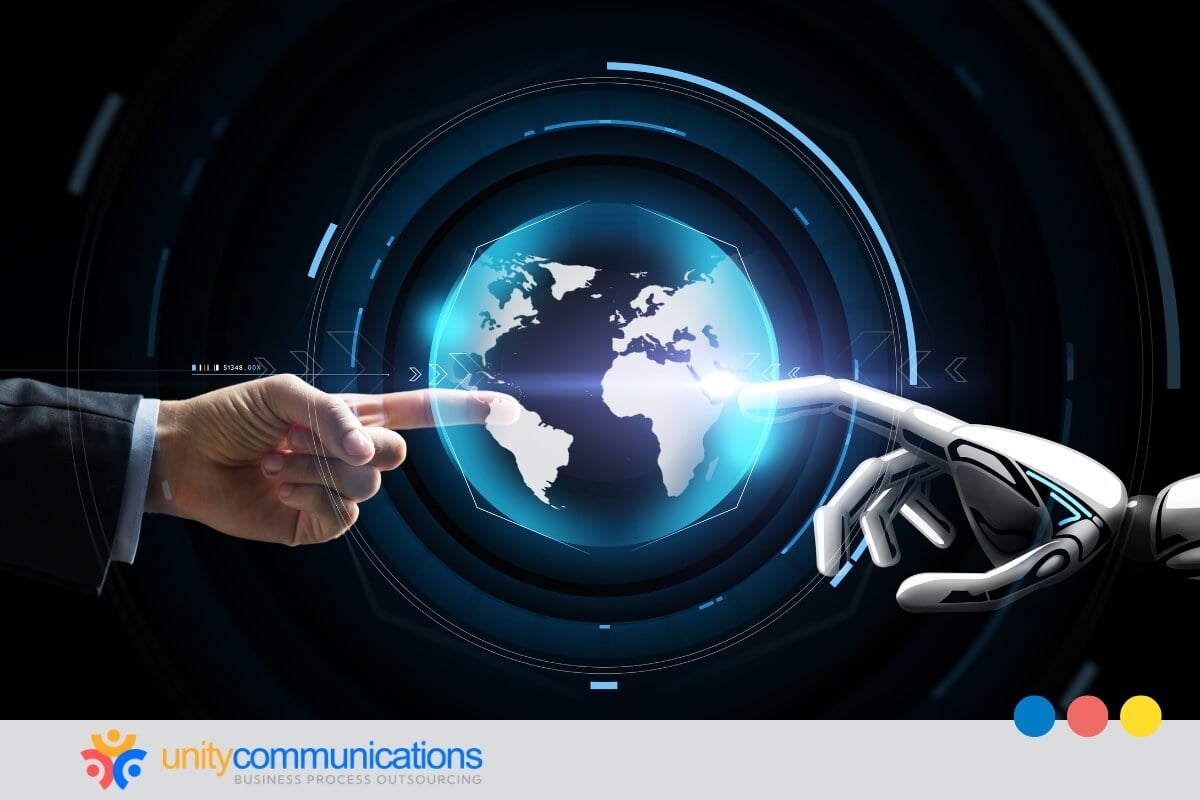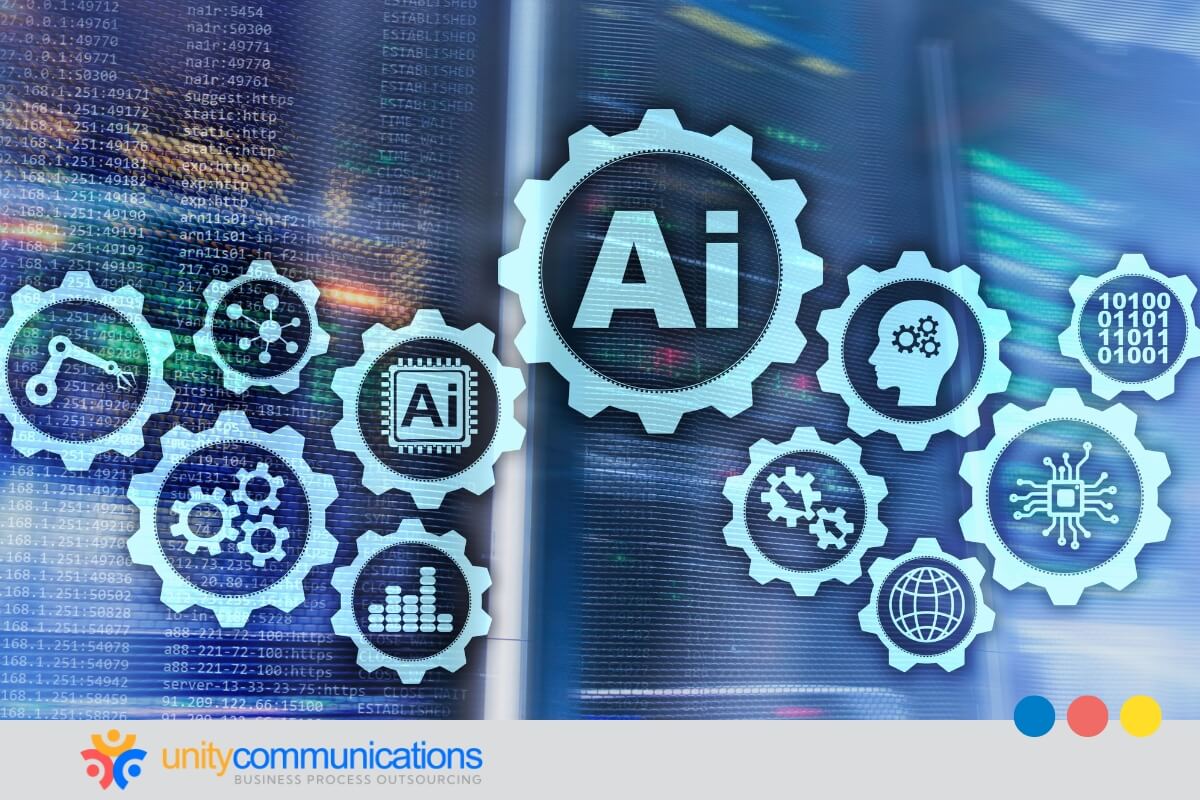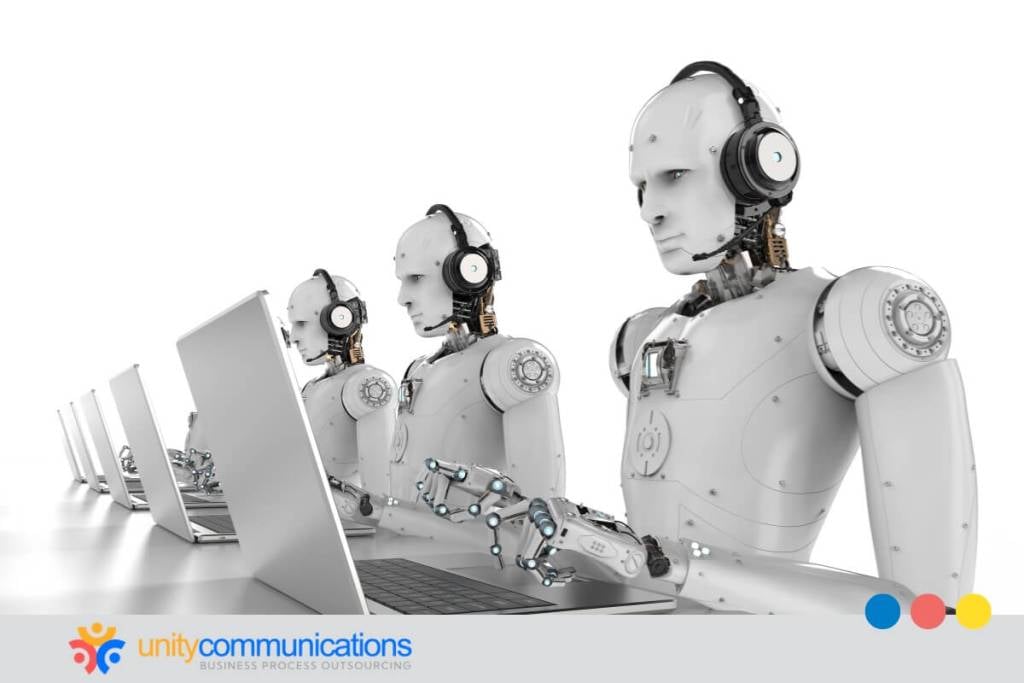IN THIS ARTICLE
Table of Contents
In 2023, artificial intelligence (AI) started to make its presence felt in the Philippine business process outsourcing (BPO) industry, specifically in the contact center space.
AI, which imitates human intelligence and conversation, is changing how the outsourcing sector operates. Higher staff efficiency and deeper customer analysis across various communication channels are among its few favorable effects.
But what about its effect on employment? Will it put many BPO employees out of work and disrupt operations?
This article discusses AI in the Philippine BPO contact center industry, its benefits, potential issues, and more. Keep reading to explore the issue.
What Are the Benefits of AI to Philippine BPO Contact Centers?

The benefits of AI in Philippine BPO contact centers include simplifying operations, increasing staff output, providing additional insight into analytics, raising first-call resolution (FCR) rates, and reducing average handling time (AHT).
Knowing the pros and cons of AI in the BPO contact center industry is essential. Let us first check out some benefits of next-generation technology for BPO companies:
- Simplifies operations. AI-driven contact and call center service operations enable customers to quickly get information about the company and its products and services. The technology automates processes, including routing customers to the right agents and providing accurate answers to common questions.
- Increases staff output. AI can improve the productivity of BPO call center agents. They can respond better to customer calls and messages since the technology provides details before the interaction. These details include the individuals on the line, their concerns or questions, and recommended solutions.
- Provides additional insight into analytics. AI offers deeper data-driven knowledge of every call center business operation segment, including inbound and outbound calls and customer experiences. It can analyze consumer data and trends to show customers’ satisfaction levels, enabling call center managers to make better decisions.
- Raises first-call resolution (FCR) rates. This key performance indicator (KPI) is an inbound call center metric for customer support. The higher the rate, the better. AI can assist third-party agents by providing recommendations and compelling responses during the interaction.
- Reduces average handling time (AHT). AI can improve the efficiency of BPO contact center agents who handle incoming and outgoing calls by reducing their AHT, which gauges the time it takes them to address consumer issues. As mentioned above, AI offers options and accurate answers that agents can use for quicker issue resolution.
What Are the Potential Issues of AI in Philippine BPO Contact Centers?

The potential issues with AI in Philippine BPO contract centers are insufficient empathy, ineffective resolution of complex issues, poor emotional intelligence, high costs, and minimal room for improvement.
AI in BPO can improve customer management. A third-party provider’s outsourcing service is more effective when properly leveraging this advanced technology. AI can enhance performance, productivity, and revenue.
But business owners also need to know what the BPO technology’s drawbacks are. Look at some possible challenges to AI below:
- Insufficient empathy. AI-enabled chatbots, virtual assistants, and other customer service tools cannot understand and share customers’ feelings. On the other hand, BPO contact center agents can detect small clues in a customer’s voice, modifying their communication style and solution appropriately to calm or build rapport with callers.
- Ineffectual resolution of complex issues. AI can deal with common customer concerns that require basic solutions. Live agents can, however, handle complex ones that require a customized approach. Trained and experienced customer support representatives can resolve unique consumer challenges.
- Poor emotional intelligence. AI can imitate human speech and comprehension but cannot understand and use emotions to interact with customers. It can neither make a cold call to solicit business from potential customers nor handle phone conversations to de-escalate a situation. Both cases require high emotional intelligence.
- High costs. While AI can be a cost-effective solution in the long run, the initial investment to own and operate it is significant. Focusing on this technology can eat at the BPO company’s budget, diverting resources from other core functions such as training and upskilling staff for better customer service.
- Minimal room for improvement. AI is skilled in regularly executing identical tasks or duties. However, humans must still modify codes to upgrade or better modify the technology. AI’s power depends on preloaded facts and information stored in its database.
What Is the Future of AI in Philippine BPO Contact Centers?

The future of AI in the Philippine BPO contact center industry looks bright. A study from the Stanford Digital Economy Laboratory and the MIT Sloan School of Management supports this forecast. It found that AI increased Filipino agents’ productivity by 13.8% based on the number of customer problems they addressed per hour.
The study gathered 3 million chats from 5,179 BPO contact center agents hired for a Fortune 500 business process software company. The AI assistant was progressively spread among employees, with most of the implementation done from November 2020 to February 2021.
The study further notes that over 80% of these agents are Filipino technical support agents, answering questions through chat from American small businesses despite differences in time zones. The AI assistant tracks customer chats and helps agents with live recommendations, while agents can ignore such suggestions.
Three areas saw a 13.8% increase in productivity, as detailed in the document:
- Reduced time spent managing an individual chat
- Increase in the volume of chats that tech support agents answered hourly
- Slight increase in the number of chats deemed resolved and completed
Will AI Displace Workers in Philippine BPO Contact Centers?
No, AI will not displace workers in Philippine BPO contact centers. At least, not soon. Despite AI’s concrete benefits to the outsourcing industry, particularly the BPO contact center segment, worries about its adverse impact on local employment loom. Many Filipino agents risk losing their jobs as AI-based virtual workers or assistants take over.
The country’s BPO sector, including the voice-based services segment, is a major economic contributor. It churned out almost $30 billion in income and over 1.5 million workers in 2022. By 2028, it expects to reach $60 billion in revenue and produce more than 1 million jobs. BPO contact center companies will produce $59 billion of the gross domestic product (GDP).
These figures indicate that the sector is still growing despite worries about the AI onslaught. However, if the sector fails to adjust to technological trends, its expansion might not last.
An AI bill was recently filed in the Philippine Congress in early 2023 to protect the BPO industry. House Bill 7396 aims to set up the Artificial Intelligence Development Authority (AIDA). One of its objectives is to handle potential threats and problems by building a broad framework for developing and regulating AI in the country.
How Can BPO Contact Center Workers Prepare for AI’s Impact?
Inquirer.net provides some answers to help BPO contact center workers prepare for AI’s impact and possible job losses. It states that more organizations are recruiting workers for AI-related roles that do not require specialized abilities, such as computer science. People without technical backgrounds can still pursue an AI career to continue working in the BPO industry.
For instance, English-proficient contact center agents can apply for data analytics translator positions. Virtual assistants who want to keep their professions in the future can study ChatGPT and other related AI tools. Similarly, tech support workers or video graphic designers can make a lateral career shift to become chatbot designers.
The article lists the different AI roles available for BPO employees with non-tech skills, including:
- AI ethicists
- AI writers
- Chatbot designers
- Data analytics translators
- Digital artists
- Domain experts
- Game writers
- Language translators
- Prompt engineers
- Virtual assistants
It adds that these positions need a basic familiarity with ChatGPT and other machine learning (ML) systems. Additionally, more lucrative positions need specific education and skills in data modeling, systematic and analytical thinking, and data science.
The Bottom Line

AI will undoubtedly influence the Philippine BPO contact center landscape. The increasing usage of AI and related technologies such as ML and robotic process automation (RPA) will likely pose challenges and disruptions in the outsourcing industry, particularly in employment and human resources.
While job losses might happen anytime soon, new employment prospects will likely emerge because of AI. Humans will still need to monitor, maintain, and improve the technology. Adding to this is the improved performance, productivity, and revenue AI contributes to organizations.
Let’s connect to learn more about how technology is changing the BPO industry!





